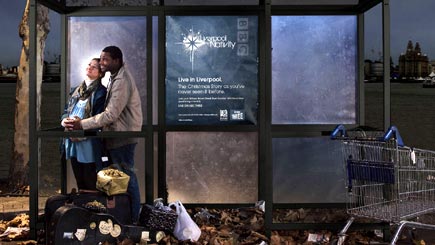
by Robert Azzi
According to the Christian calendar, it is Advent, the season observed in many Christian churches as a time of waiting and preparation for the celebration of Christmas and the birth of Jesus in Bethlehem. The Nativity story in the Gospel of Luke tells the story of Mary and Joseph, Jesus’s parents, traveling from Nazareth in the north of Galilee to register for the Roman census in Bethlehem, Joseph’s ancestral home, 90 miles away.
Their world was challenging, especially in winter when cold rain was common and where nighttime temperatures sometimes fell below freezing. Their travels probably took them through Galilee, along the lowlands of the Jordan River, west over the Jerusalem hills and then down into Bethlehem.
Luke’s Gospel doesn’t reflect upon the hardships of such a journey, especially the crossing of the forested valley of Jordan River where travelers were frequently threatened, according to archaeologists, not only by flesh-easting lions, bears, and wild boars, but also by, according to the Rev. Peter Vasko, a Catholic priest and director of the Holy Land Foundation, ”bandits, pirates of the desert and robbers.” Facing such danger, solitary travelers often joined caravans for protection. ”It was like the pioneer days with wagons and coaches,” Vasko wrote. ”Traders took a number of people with them as passengers, and they (Mary and Joseph) probably had to pay something for protection.”
Imagine: A caravan!
Witness that Alan Kurdi, a three-year-old refugee Syrian boy, drowned on September 2, 2015 in the Mediterranean as he and his family, along with a caravan of other refugees, were trying to reach sanctuary in Europe. Witness that Maria Meza – a 39-year-old migrant from Honduras who had walked for weeks, along with her two toddler children, as part of a caravan from Central America to Tijuana – was gassed by US Border Patrol agents across the international border with Mexico.
Bear Witness and wonder:
What if there had been no caravan to protect Mary and Joseph.
Bear Witness and wonder:
What if Moses had not parted the Red Sea permitting the escape of the Israelites from pursuing Egyptians.
Wonder, if you will – especially those of you welcoming Advent in this nation built by immigrants and refugees, in this nation ostensibly Christian – what happens when there is no sanctuary, no shelter, no respite for the sojourners.
Sanctuary was denied in May, 1939, when the American government refused to allow 937 passengers traveling aboard the SS St. Louis – mostly Jewish refugees – to disembark. Of the 937 returned to Europe, 254 perished in the Holocaust.
Maria Meza, and her fellow migrants from El Salvador, Honduras, and Guatemala are fleeing hopeless situations that America is in part responsible for. Dysfunctional governments, often ruled by corrupt and incompetent leaders, are unable to protect them from drugs, vicious gangs, rapists and sex traffickers – and so they flee for refugee and hope. They flee a dystopian world resulting from the overthrow of populist governments, of tyrants supported by imperialists, of displaced small farmers, of government-disbanded labor unions, and from the exploitation and removal of natural resources without just compensation.
They flee; they flee searching for sanctuary and security. Others, of course, flee also for economic opportunities that don’t exist – for reasons stated above – in their home countries. They flee in caravans. They travel together for protection from lions, bears, wild boars, bandits, and pirates. They flee – these citizens of El Salvador, Honduras, and Guatemala, often joined by others – to escape the dystopian conditions imperialism and corruption created in their home countries.
We don’t get to choose which caravan to protect.
They appear at the border of those who have so long profited off their distress and labor. The sojourners have no choice but to travel, to claim refuge among those who acted to displace them – or who were complicit, through silence, in their exploitation.
We don’t get to choose which caravan to protect.
We must recognize that caravans, the movement of peoples – whether migrants from Central America, Rohingya fleeing genocide in Myanmar, or refugees from Syria and Iraq – are not voluntary acts. They’re acts of upheaval and disruption, acts of desperation, a forced abandonment of land, culture and tradition in order to try and secure life and safety for their children.
I believe these travelers who arrive carrying only small bundles of meager possessions, their children clinging to hems and sleeves for safety, are not feared because they are a threat to our sovereignty and security. Instead, I believe, too many people fear the caravans and the sojourners because they are forced to confront the consequences of actions taken in their names. They are shamed by the migrants and their children of their complicity in the acts of dehumanization against peoples from whom America has profited through acts of exploitation and appropriation.
Today, witness Maria Meza, a 39-year-old migrant from Honduras, clinging to her small children and running away from a tear gas canister fired by our Border Patrol agents.
“In those days Caesar Augustus issued a decree that a census should be taken of the entire Roman world” (Luke 2:1).
All Maria Meza wanted was an opportunity to legally plead her asylum case before American immigration authorities.
Caesar attacked her with “Very Safe” teargas instead.
Robert Azzi, an American-Arab-Muslim columnist and photojournalist, writes on issues of Islam, Identity, Conflict and The Other. He’s active in interfaith work, often with Episcopal colleagues in New England. His commentary – and information on his program “Ask a Muslim Anything” – is archived attheotherazzi.wordpress.com
image from BBC Liverpool’s reimagined Nativity story from 2007

